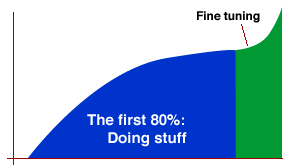#1 Reason You're Not More Successful
I hinted at this in my posts about Blog Action Day and What All Those Fundraising Books Don’t Tell You.
The difference between success and failure isn’t smarts or money. It’s not your logo or your office or your website.
You’re not more successful because you’re not doing more.

All the fine tuning, testing, strategic planning, and seminars won’t do you any good in a vacuum. Those can take you from 80% up.
But going from 0 to 80% is easy – it’s just a matter of taking action and doing something.
As 37 Signals often says, If it works, do more. If it doesn’t work, do less.
We stopped our strategic planning because it was a distraction from doing the work. We weren’t at a stage where extensive planning sessions were helping us. We didn’t have our house in order. We weren’t actively fundraising and marketing our programs. We weren’t collecting the right information. We couldn’t even speak intelligently about our financial picture.
So we hit “pause.” Six months later, we feel much more secure about all facets of the organization. This winter, we’re starting our strategic planning again.
GOYA
My designer friend Oak taught me this acronym: GOYA. It means “Get Off Your Ass.” Sometimes I set it as my desktop background just so I have a constant reminder (download the wallpaper) to myself that I need to put up or shut up.
So your challenge each day is to accomplish something that helps advance your mission. Call or visit a donor. Write a thank you note. Make a quick decision and execute.

2 Comments
Chas Grundy — October 27, 2008
This is a great comment… I debated putting this post on grundyhome.com as well, because it’s really the same lesson for small businesses and entrepreneurs: the difference between most of us and the people we strive to be like is that they took initiative.
The first step can carry you 20% of the way there. It builds momentum. And if you’re really good you can parlay that into the next 30%, 50%, 70%. And for most of us, being at 70% is enough to make us really happy.
-oAk- — October 27, 2008
You say: “We stopped our strategic planning because it was a distraction from doing the work.”
I think we’ve all been in meetings like this where “strategic planning” (or some other buzzword) stops being productive and starts to become “what we do to cover up the fact that none of us knows how (or has enough faith in our ability) to accomplish things.”
GOYA is constantly weighed against the consequences of failure and the complexity of the organizations goals. When the task seems too daunting, or if leadership doesn’t have enough faith in themselves, all meetings will end up like the strategic planning meeting you described. At that point, Strategic Planning becomes camouflage for Fear of Failure. “We can’t start that project, yet. We haven’t [insert superfluous planning task here]”
Almost always, setting basic goals that would get you, say, ten to twenty percent of where you need to go would be a much better strategy for a couple of reasons: you’ll learn a lot about the task, you’ll immediately see ways that productivity and efficiency can be improved, and the simple act of breaking the moment of inertia can serve as a significant kick in the pants to start churning on the problem.
Ironically, you WILL find the time to do the project in a frenzied rush at the last minute, and you WILL find time to redo it when the client isn’t satisfied. At least then you’ll have the excuse that “we’re always so jammed with work that we couldn’t give this project the time it deserved.” (I suspect that this is actually a positive if you don’t genuinely believe in your ability to create great work).
I doubt very many truly great enterprises use the “we have too much work so we couldn’t make this project great” excuse and conversely, I’ll bet it’s a very popular excuse among the merely competent enterprise.
I struggle with this problem on every project I work on. The fear of failure battles the meticulous drive for professionalism. Professionalism generally wins out but at the cost of valuable time that could have been spent testing, retesting, and reworking, and it is only in this process that truly great solutions emerge.